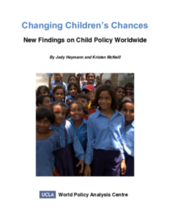This new report by the World Policy Analysis brings together key findings from the book, Children’s Chances: How Countries Can Move From Surviving and Thriving, providing a global picture of what laws, policies, and programs countries have in place to address areas vital to children’s healthy development, including access to quality education, protection from child labor and early marriage, good health care, working conditions for adults that enable parents to care for their children through policies guaranteeing minimum wage, paid leave and family benefits, freedom from discrimination, and access to resources to meet basic family needs. The report uses world maps, data charts, and regional highlights to elaborate on the statistical findings and trends, including differences between high income, middle income and low income countries.
Of particular relevance to children’s care, the report highlights transformations in the world of work globally that have made paid labor an even more crucial determinant of families’ ability to provide care for their children. The report found that providing paid leave for new mothers is the norm across regions and income groups, with only 8 countries not providing this leave, including one high-income country (US). Although evidence confirms that paid leave for both parents can significantly improves infant and child health, only 81 countries provide paid leave that can be taken by new fathers; 40 of these countries provide less than 3 weeks. Study data shows that when fathers can take leave, they are given more opportunities to get involved with their infants and childcare responsibilities are more equally shared between the two parents.
Parental care is important for children’s outcomes beyond infancy and makes a marked difference to children’s health. When parents are involved in their care, children are likely to recover more rapidly from injuries and illnesses, have chronic conditions under better control, and follow medical advice regarding prevention and treatment. Without guaranteed access to paid leave, working parents risk income and job loss when they must take time off to care for a sick child. Only 54 countries worldwide were found to provide parents with paid leave specifically to meet their children’s health needs. In countries that provide unpaid leave, parents are protected from job loss when they are caring for a sick child, but they still suffer wage loss; 16 countries guarantee only unpaid leave for children’s health needs. The report points out that being able to attend to the child’s need with paid leave supports and strengthens children’s development and their healthy family functioning. Therefore, ensuring that paid leave is available to fathers as well as mothers is essential to strengthening families, preventing separation, and providing optimal care environments for children.
©UCLA World Policy Analysis Centre

